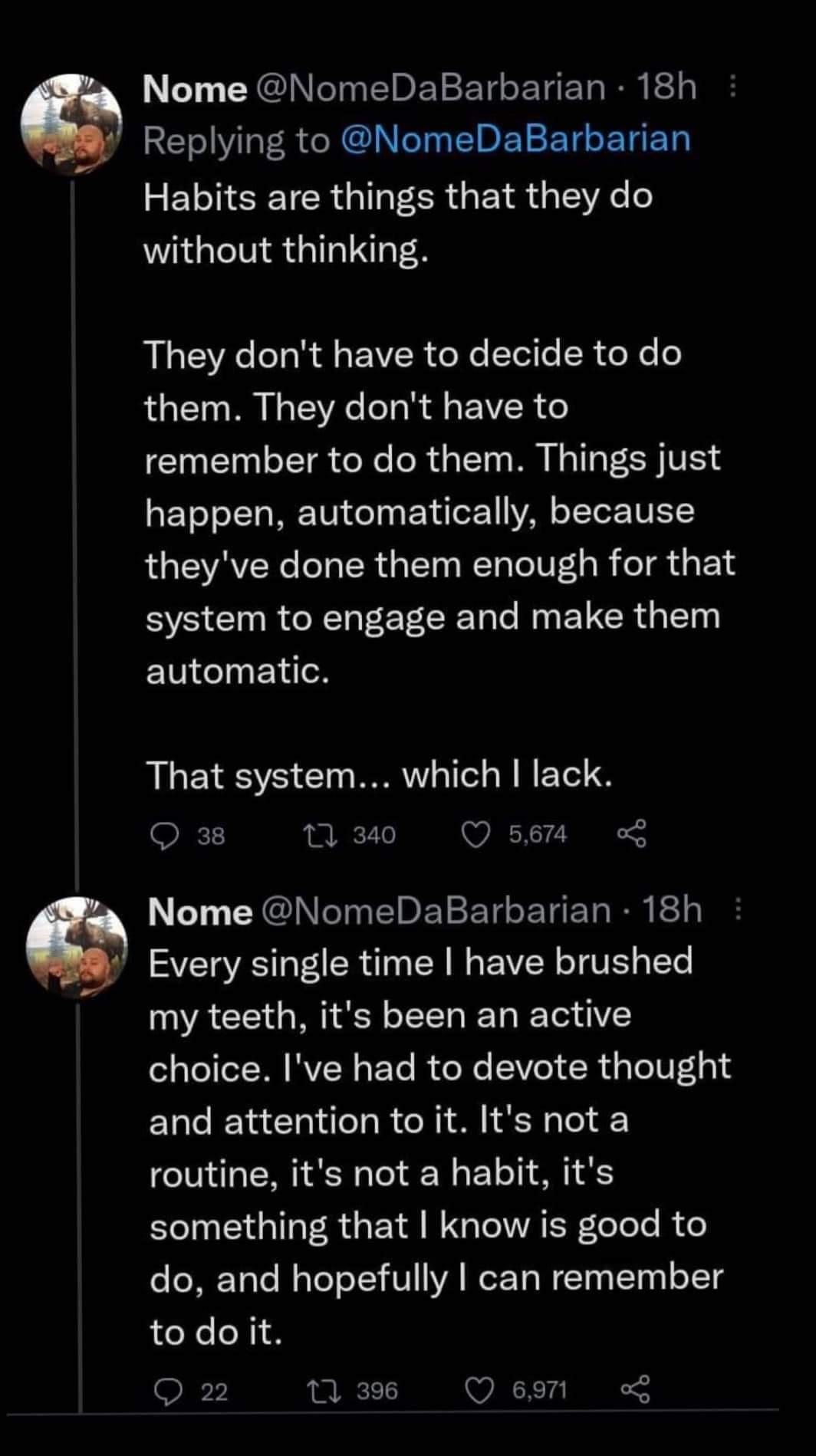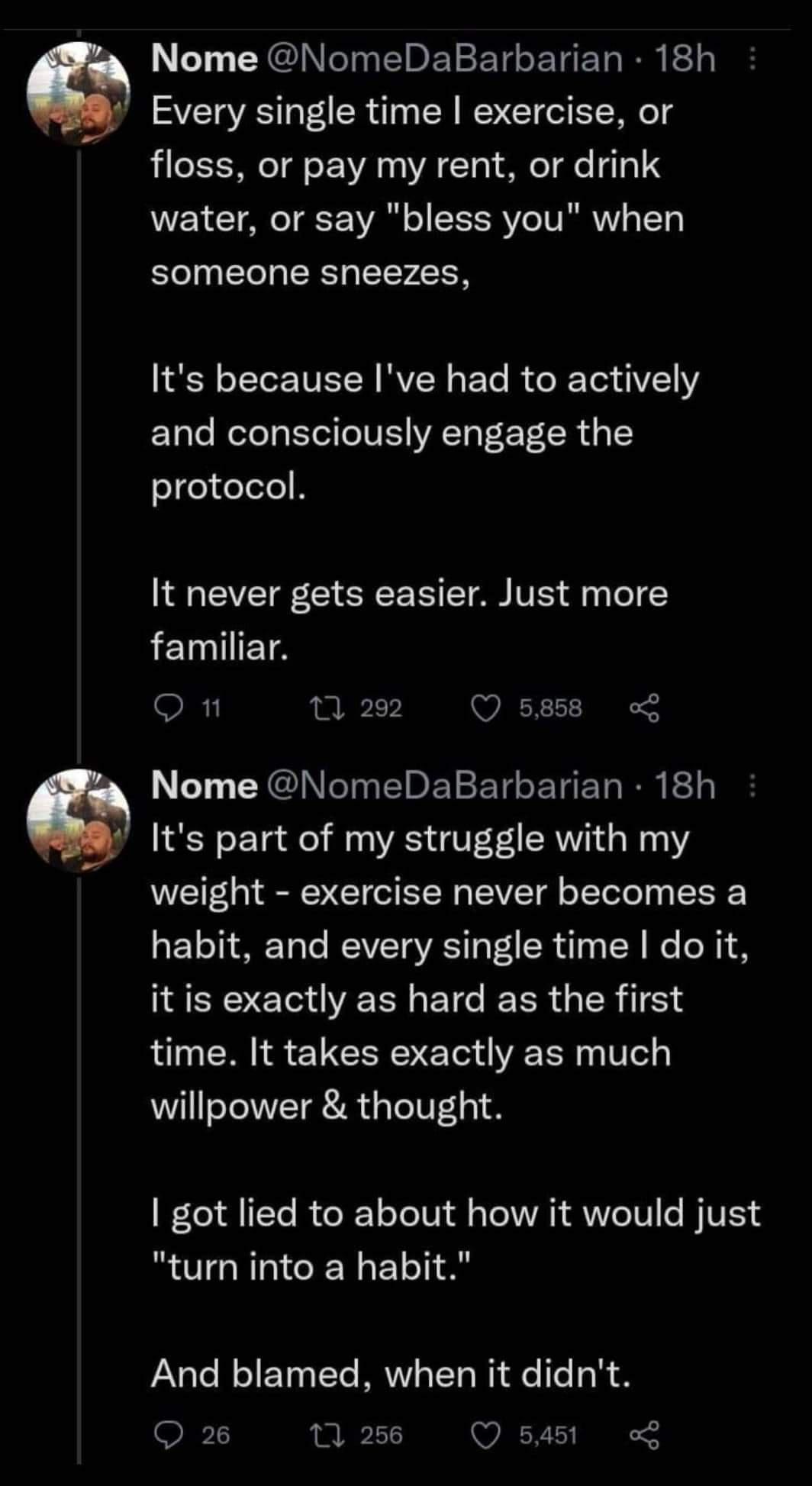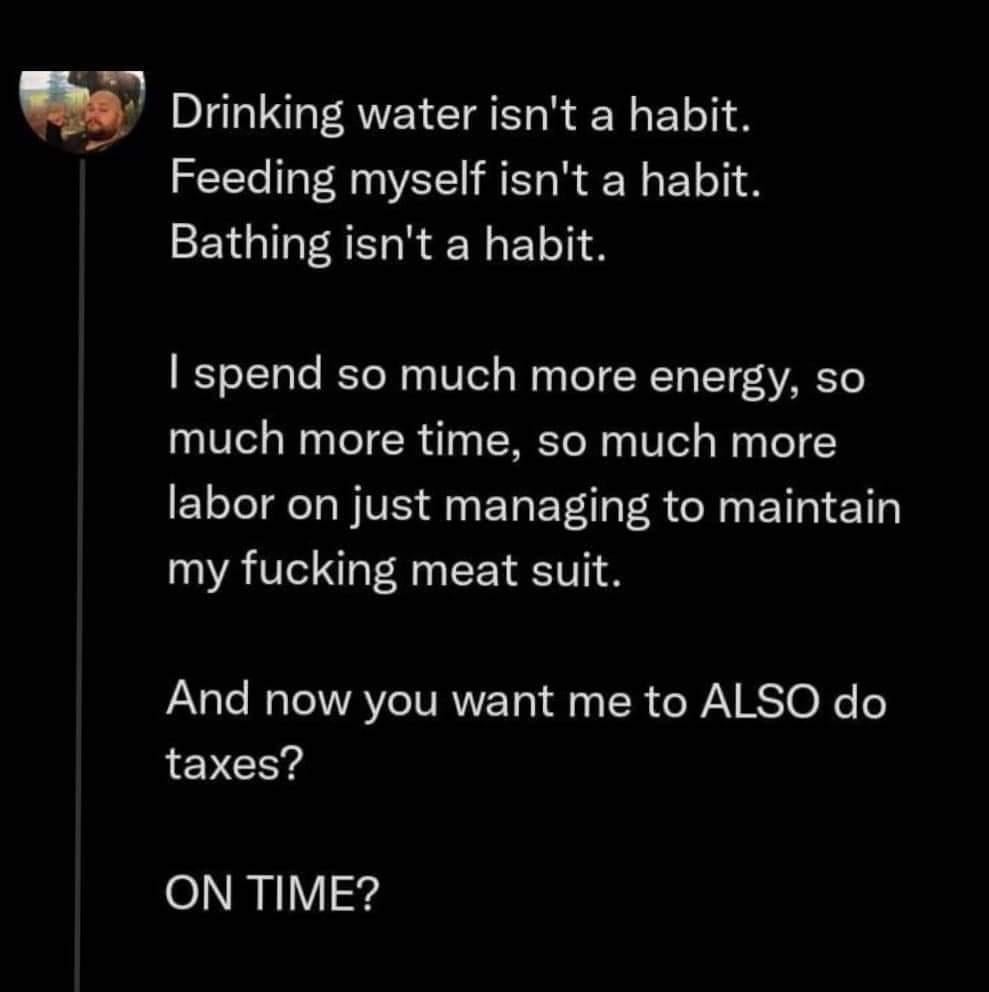Thank you Nome @NomedaBarbarian
For the visually impaired, the images are a series of Twitter screenshots.
Full transcription of text below images.

Full transcription of text below images.

Full transcription of text below images.

Full transcription of text below images.
@NomedaBarbarian on Twitter:
Thinking about how I’ve been lied to as an #ADHD person about what habits are.
That apparently is not what neurotypical folks get to experience.
Habits are things that they do without thinking.
They don’t have to decide to do them. They don’t have to remember to do them. Things just happen, automatically, because they’ve done them enough for that system to engage and make them automatic.
That system…which I lack.
Every single time I have brushed my teeth, it’s been an active choice. I’ve had to devote thought and attention to it. It’s not a routine, it’s not a habit, it’s something that I know is good to do, and hopefully I can remember to do it.
Every single time I exercise, or floss, or pay my rent, or drink water, or say “bless you” when someone sneezes,
It’s because I’ve had to actively and consciously engage the protocol.
It never gets easier.
Just more familiar.
It’s part of my struggle with my weight–exercise never becomes a habit, and every single time I do it, it is exactly as hard as the first time. It takes exactly as much willpower & thought.
I got lied to about how it would just “turn into a habit”. And blamed, when it didn’t.
Drinking water isn’t a habit. Feeding myself isn’t a habit. Bathing isn’t a habit.
I spend so much more energy, so much more time, so much more labor on just managing to maintain my fucking meat suit.
And now you want me to ALSO do taxes?
ON TIME?
I fail to see how this is not the case for everyone.
Absolutely no one has a habit of paying taxes. Or brushing their teeth.
I would argue that what you have is depression here, not adhd. You need help.
Yeah the “meat suit” comment makes me think some kind of dysmorphia or something , that’s friggin weird man. Our meat suits are how we experience the universe and they profoundly impact our state of mind and being. To deny it demonstrates a very odd disconnect from reality.
I think the OP was being dramatic for emphasis with the “meat suit” comment. That said, I’m guessing that you’re younger than me or have few health complaints. Not casting shade, but it’s not exactly uncommon for people as they age to start feeling a mind-body disconnect. For example, my mind says, “I can redo my own roof!!!” and my knees say, “hahahaha foolish hu-mon,” (they’re Ferengi knees) “we will randomly dislocate your kneecaps the moment you get up there and you fall to your death.” I’m not saying I think I have a “meat suit” every day, but there are definitely stretches of weeks when my body is having a spell that I definitely feel that way.
I actually do have a habit of brushing my teeth. It’s part of my morning routine, which I do in the exact same order, every day. But, I’m autistic (I was diagnosed as a teen in the 80s). I’m one of those persons that has a very exact routine, and get really upset when my routine gets interrupted.
But, I do agree with you that some of those symptoms seem more indicative of depression than ADHD.
They weren’t claiming that people had a habit for paying taxes in general but that because nothing else is a habit they lack the energy to do the things that other people already consider draining when they had to spend so much on things that come naturally and in a way for free to others.
I would argue that brushing your teeth certainly seems to be habitual for most people. It’s something they’d do if they went through the bathroom routine in the morning while effectively still asleep. This person is saying that if they don’t effectively stand in the bathroom and look at the brush and decide “I will now brush my teeth.” they won’t do it, where someone else had grabbed the brush while thinking about what they need to get done later in the day.
Depression on the other hand would more likely manifest in a disregard for the necessity of the activity. This person says they do brush their teeth, they want to brush their teeth and they are ready to spend their existing energy on it.
A depressed person often would not be convinced that it matters, nor that they could even make themselves do it if they felt like they had to. Though naturally depression is expressed in many ways, as is any type of neurodivergence. It’s hard to put strong labels on these things. Nonetheless it seems sensible to differentiate on these things as most neurodivergence is simply a set of untypical phenomena and behaviour that have collected up enough to start becoming notable.
A person considered completely normal could suffer from the same but simply manage well enough for it to never stick out. No one is entirely normal.
Nothing is a habit, eveything is an alarmed notification. This is the lifestyle i will lead to late future since can’t afford therapy and ritalin anymore
I think that the neurotypicals have ability to make these things onto “habits” that then happen automatically for them.
As a person that has to remember to every time, and decide everything I do, from what time I get up, to when I drink (and what) to when I shower or even brush my teeth, it is exhausting just maintaining daily hygiene and while I fully understand why I need to do all those things and WANT to do them to maintain myself, none of it comes without considerable forethought and considered decision making.Frankly it can be exhausting just to exist, let completely alone, progress.
I’m not really into modern slang, but I’m “feeling seen” today. It makes me sad, though, that so many people share this with me.
So I have undiagnosed adhd, fantastic
Nuh uh. You’re just quirky. /s
I’m fairly certain I’m ND, but never fully knew if it was Autism (Aspergers?) or ADHD. Mom never followed up on the testing when I was a kid (and neither did I as an adult), but autism runs high in my family, and I have low and high functioning extended family.
Yeah, definitely not ADHD. I have issues, stims, triggers, but I’m functional, and can definitely form habits, and don’t necessarily experience the issues noted here.
Reminder that this, like many things associated with ADHD, is normal for neurotypical people, too.
It tends to be more common or more pervasive for people with ADHD, but it isn’t exclusive to people with ADHD.
General tip: Whenever you see someone claim that a certain way of thinking is exclusive to people with ADHD, they’re most likely wrong.
Agreed. 100%.
Sometimes though, when we’re frustrated and dumping that out, it sounds like we are saying that. It’s very easy to ‘us vs. them’ the situation.
Example: “Oh my god! Other people remember that they are boiling water for eggs? I have ADHD and I forget and leave the kitchen to do something else all the time. This suuuucks! It’s not fair for us.” I’m sure that there are some ADHD people who don’t have to work with a technique just to cook eggs (I do. I set timers.), but there you have it.
I think the rubric is basically whether or not the behavior is disruptive to your life. Many neurotypical people do those things from time to time, but if it becomes overwhelming and pervasive, and keeps you from functioning effectively, it’s time for an evaluation.
Would having off the charts procrastination on even the tiniest tasks that I absolutely know have to be done to the point of having to pay thousands for a dental problem I put off until i couldn’t stand the pain count as disruptive to my life? Not sure why I asked this because I answered my own question damn. Glad I started therapy so I can get to the bottom of this.
So as a NT that is only recently thinking about how ND I might be, what’s striking about this to me is that no only do I not have or form any “automatic” habits, but I think my lack of such or my lack of ability to form them has formed a deep aspect of my personality.
Like, I don’t want to do anything “automatically”, and any kind of environment or culture or expectation that relies on “just doing things automatically” is something I not only dismiss as unappealing and even “bad” but something I even get suspicious about and about the kinds of people that get into that. Like, however productive and helpful it is, I honestly think I’ve developed an unconscious distrust of people that simply “do things automatically” on the grounds that they’re not plugged in enough to values and purposes and the “why this should be done”.
Of course, maybe I’ve got a point there. Though maybe virtue doesn’t play a role when it comes to the dishes. My point though is that I’m pretty sure I’ve incorporated this as a given and allowed it to inform my worldview, so I guess that’s fun.
This is a different voice. This is why I like the internet. No sarcasm.
Ditto and appreciated.
A fellow NT (as in undiagnosed, but have some ND traits) here with a very similar mindset. I love thinking about why I do what I do, I love having a reason to the way I do stuff and I love having an informed decision process. But I find that thinking about stuff equal caring about them, at least caring about them more than necessary. And don’t you wish to not care as much all the time?
I’ll put aside things like how to raise the kids or work decisions (even if I think about them more than the average person). I don’t like to care so much about how the dishwasher is loaded, or the optimal placement of cups in the cupboard. At least not always and leaving things alone is also a mental decision which requires some effort.
To be clear, I’d rather be the way I am. Just wandering how other people handle it.
Yes, it is a cliche that “habits are hard to beak”, because they are things you’ve done so much that you are condition to do them automatically. Like, dictionary definition.
No, xd, nobody just exercises without initiating it. The point of making exercise as a habit is that if you have this momentum then you might feel a slight obligation to do it and be more familiar with it so it’s not intimidating.
I’m not sure understood what Nome was trying to say. The momentum of which you speak never happens.
I’m not the one downvoting you, btw. Thank you for sharing your viewpoint.
I mean he literally said “Habits are things they automatically do, without thinking. They don’t have to decide to do them.”
That’s not true, everybody has to think about whether they’re going to start some activity or not, muscle memory helps with e.g. driving so you don’t need to think about how much to press the pedal or turn the wheel when driving, but you still have to think about where you’re going (though I guess that can be relatively automatic by itself if it’s somewhere where you regularly go).
What I’m guessing might be a difference is that for other people it’s easier to start the activity itself because they feel an urge to do it, like they’re doing something bad if they don’t or that they feel their teeth being dirty if they don’t brush them.
That’s not true, everybody has to think about whether they’re going to start some activity or not
I think that a key difference between a habit vs not might be that when it’s a habit, the decision you’re thinking about when planning your course of action is less “whether to do the thing” but more “whether not to do the thing”. For example if you’re in the habit of eating regular meals, the question is “should I skip/postpone dinner”, but if you’re not then the question is “should I make dinner”. Sure, you have as much choice as you have in any other thing, but your default course is different.
Crucially (I think) that while the questions technically result in the same outcomes, they can engage different values: for example ‘should I make dinner’ feels like it goes first to how much effort you feels like expending, while ‘should I skip dinner’ feels more like it starts with how much time you have.
This particular post isn’t very… polite toward neurotypical people.
Like you say, there’s a key difference between “making a behavior into the default” and “consistently managing to do something.”
But I think we can both understand that this is likely to offend the neurotypical folks wandering onto this page. Especially because we’re all pretty new to Lemmy (NTs and NDs alike) and I can guarantee you most of us still don’t know where to find the “block community” button on the sidebar. Meaning they literally don’t know how to avoid this kind of content popping up on their “all” and “local” feeds.
To put this in real-life terms, this lemmit is like an ADHD support group… but there’s a young, inexperienced sommelier standing outside on the street offering free pizza and beer to random strangers saying, “come on in! This place is bumping!”
… and then, the neurotypical people he has invited in (along with neurodivergents and everything in between), after sitting down in a circle with the rest of us – not sure why there’s no disco lights or dance music – proceed to immediately receive complaints about how much easier their life is than ours.
It wouldn’t feel great being in their shoes right now.
By momentum I don’t mean you naturally find yourself with an urge to do it, I mean you might feel guilty because you cheated on an obligation you set for yourself- and you had s streak going for it
Habits are pretty much definitionally subconscious, so this person is most likely describing poor habits rather than an entirely different type of habits. I wouldn’t be surprised if habit formation is significantly more challenging with ADHD, though.
No, not poor habits. I have ADHD and–like the author of the tweets-- it takes mental energy to do many things that I think most people don’t think twice about. Saying someone has poor habits, saying someone is disorganized, saying someone needs to stop being lazy…I’m just over it. I’m not mad at you, and I wouldn’t expect you to care if I was, but I don’t think you realize what an executive function disorder does to a person and being blamed for things that are harder for us is the reason anxiety and depression are so prevalent in people with ADHD.
But anxiety and depression can provoke the symptoms described in OP. In this specific case, the cause is backward.
Probably adhd will lead to more anxiety and depression, but many other things do. And many people, if not most, will live what’s described by op.
“In this specific case, the cause is backward.”
You have absolutely no way of knowing this, and it’s an incredibly irresponsible claim to throw out there.
In women especially, ADHD will overwhelmingly be misdiagnosed as depression and anxiety. Treating the ADHD removes the need for antidepressants and anti-anxiety meds.
And I never said you needed to treat depression instead of adhd. But whatever.
I’m not sure what is going on with this stuff. Habit is another word for automation and we all have that. Nobody is consciously growing their hair. When you move up to behavioural habits it becomes less clear. We fundamentally don’t understand where our motivation comes from. It amazes me how much behaviour people take credit for. Sit in silence and listen to your mind, the thoughts arrive continuously and they are unpredictable. If you can admit that you don’t really know why you do the things you do, life is easier. It’s just a process that unfolds, moment by beautiful moment.
If you think that growing your hair is a “habit”, you’re in for a huuuge set of revelations, son. To say nothing of your flippant disregard for a headspace you clearly have no point of reference for, thus leaving you to perpetuate the the patroniziing dismissal of the struggle.
Do better. Take your own advice. Sit in silence and listen to the minds that actually know wtf they’re taking about. 😬
It’s not a dismissal, I recognise the struggle. I’m drawing the parallel between habit and automation, conscious and unconscious. Diagnosed ADHD, by the way.
I was in my mid 30’s when I was diagnosed with ADHD. Actually my twin daughter’s ADHD doctor asked me at one of their appointments if I had ever been tested/ seen about it. I was kinda confused since I didn’t think at the time I had it. Once I get tested and then started on ADHD meds… my whole life of struggles became clear. I had struggled with anxiety and depression from middle school on and was on two-three meds for that. Even then I still struggled with anxiety and panic.
Once started on ADHD meds, no longer needed my anxiety or depression meds. My doc said my ADHD presented with that. So that was a bonus!
I can’t stay focused, I “spin in circles” as I call it. Where my brain is like “boot looping” basically. I can’t start all the projects/ tasks I know I need/want to do… so I literally… SPIN. I get super frustrated with unfinished tasks and easily get distracted with something new.
Ie; folding laundry… start putting them away and see I need to empty the trash in the bathroom, then, see the dishes need doing so Ofc I start washing them…and then one of my daughters starts talking to me and I’m off doing something else for them. End result? Bullshit. Laundry not done, dishes half assed… kid’s task… well that’s completely done cause I have them there in front of me making sure it’s done… oh and trash IS emptied but I lost the trash can somewhere. Probably where the laundry is.
That is a typical day. I also am so “busy” all day I don’t eat till right when I’m sitting down for the first time all day and then I graze all evening long till bedtime…
halfrommalcolminthemiddle.gif
The shame of the incomplete task. Or I restarted it several times, got lost, and fully fucked it.
Relatable
There are things that I get to become automatic but they’re very small
Thats normal, stuff like hanging your keys up or something
…and that is good.
You always are mentally and actively doing something otherwise you’d be unconscious. Habits just means the mental resistance becomes a lot lower. If you struggle to brush your teeth, it’s a lot of effort to initially get you to go the bathroom. When it’s a habit, there’s usually a trigger that gets you to go to the bathroom without having to expend all that energy as much. Unconscious habits are automatic which are different.
Yeah this. I don’t automatically do things without thinking.
I like to make a cup of coffee each morning. It’s a habit. I don’t really spend time thinking about whether I’m going to do it first thing each morning because it’s so deeply ingrained - of course I will want to do that tomorrow when I wake up. I’ve performed this ritual so many times that I do know all the steps (although I do occasionally fuck it up).
However, I’m not going through this process like an automaton free of thought - somewhere between the bed and the kitchen there’s still a decision that I’m going to make a coffee. Some mornings I pee before coffee, some mornings it’s after - there are decisions being made.
The thing is I’ve been making a cup of coffee reliably every morning for more than a decade and I still need to spend time thinking about whether I’m going to do it.
Exactly and there isn’t a guarantee that you will always remember to do so, right? It is like the memory of these tasks that are part of average people’s routines has to start over fresh every single fucking day, multiple times a day depending on the task or your mood or whatever else may distract you.
Yeah. Like the character in memento I suppose, albeit in a subtler way.
Yes but for “normal” non-ADHD people, usually the action in question becomes a routine that requires very little thinking energy. This isn’t always the case with ADHD people. I have learned to adapt to certain things like brushing teeth, taking my allergy meds is a new one because allergy season in the south has gotten so bad, but the key factor, I think is that consistency is just about impossible. As someone up above posted, we will fall off a cliff and drop all of it, and who knows when we will pick it all back up again, because it is a constant mental strain. You don’t have to think about walking and breathing, but sometimes ADHD people may as well have to when it comes to thinking about accomplishing things.
I think with ADHD people things that end up taking very little thinking energy for non ADHD people, take the same amount of energy if not more, all the time, which is exhausting. I believe it is easy to take that for granted if you’re not having to expend the energy constantly.
I’m like this too, as a neurodivergent without ADHD. Everything I do, I do deliberately and thoughtfully, with intense focus. Even driving, I can’t go into autopilot mode. It’s probably why I need a nap most days…
This is neurotypical.












